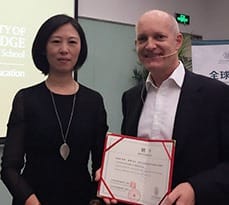Simon Taylor of Cambridge Judge Business School is named Honorary Senior Education Consultant by China Minsheng Academy, part of China Minsheng Bank.
Simon Taylor, Director of the Master of Finance (MFin) programme at Cambridge Judge Business School, has been appointed Honorary Senior Education Consultant by China Minsheng Academy, a charitable higher education institution established by China Minsheng Bank.
The appointment was made in Beijing during a June trip by Simon to China, where he also delivered the first masterclass of China Minsheng Bank’s Fortune Forum Series. The masterclass was attended by managers from China Minsheng Bank, the People’s Bank of China and other banks in the Asia Financial Cooperation Association.
During the trip, Simon also met with the director of the research division of the China Banking Regulatory Commission and visited Guangxi Institute of Public Administration in Nanning City, where he gave a talk on the opportunities of co-operation in the energy sector between China and the UK. This year, Simon published a book entitled The Fall and Rise of Nuclear Power in Britain, which looks at Chinese investment in the proposed Hinkley Point nuclear facility in southwest England.
China Minsheng Bank is a client of the School’s Executive Education division, so Simon’s honorary appointment reflects a deepened partnership between Cambridge Judge and China Minsheng Bank. In addition to his Cambridge MFin role, Simon is Deputy Director of Executive Education and Senior Faculty in Management Practice at the School.
 The masterclass conducted by Simon was entitled “Lessons from Financial Liberalisation,” which was timely given that China is in the middle of liberalising both its domestic and external financial systems. Such liberalisation is designed to eventually allow the free flow of funds in and out of China.
The masterclass conducted by Simon was entitled “Lessons from Financial Liberalisation,” which was timely given that China is in the middle of liberalising both its domestic and external financial systems. Such liberalisation is designed to eventually allow the free flow of funds in and out of China.
“The talk reviewed the evidence of what happened when other countries, both advanced and developing economies, did the same thing,” says Simon. “In sum, most countries that liberalised had a financial crisis, usually in the banking system, a few years later, including the UK, South Korea, Japan, Turkey and Israel. The main exception is Canada.”
The main lessons from financial liberalisation in other countries include: liberalise the domestic financial system first; proceed gradually rather than force a sudden deregulation; maintain tight regulation on credit to prevent a lending boom as controls are lifted; and to pursue liberalisation when the broader macro-economy is healthy but not already booming.
Masterclass participants were told that the risks of financial liberalisation to China are very real, given the country’s rapidly rising corporate debt, but China has the benefit of learning from history and a pretty good record of dealing with earlier banking problems – including the government’s rescue and recapitalisation of banks in the 1990s.
Simon Taylor said:
“Given the enormous importance of the Chinese economy to the rest of the world we must all hope that China gets it right.”

